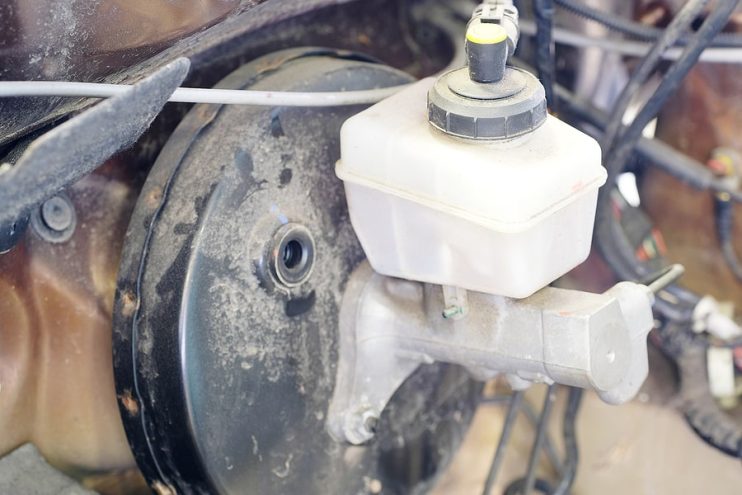
Brakes slow your car by applying pressure through the callipers and discs (or a similar system). The force behind the pressure is generated by the brake master cylinder when you depress the brake pedal. As one of the main components in the braking system, if the cylinder develops a fault or stops working, then this could have some severe and potentially dangerous consequences.
Without question, the most common symptom of a problematic brake master cylinder is a spongey, or even sinking, brake pedal. Brake fluid will also often leak from a faulty cylinder leaving tell-tale fluid puddles underneath your car. Braking performance may also be impeded as the part starts to fail. Take any issues with your braking system seriously – check this detailed list of symptoms to catch any failure as early as possible, to avoid putting you and your passengers at risk.
1. Brake Warning Light
If your master cylinder is suffering from problems, one of the first symptoms will be the brake warning light. If your car has a sensor this will alert the driver by turning this light on. Because the pressure within the system is generated by the brake master cylinder this can often be indicative of a problem with the part.
If on the other hand you find yourself frequently topping up brake fluid, then the culprit could well be a leak within the brake circuit, which could be coming from a fault within the master cylinder. There is also a chance a fault with the part could cause the check engine light to illuminate, in which case you’ll need to take the vehicle to a garage, so a professional can diagnose the exact cause.
2. Brake Fluid Leak
Leaks underneath your car are often a cause for worry. Because the master brake cylinder applies the required pressure to dampen your vehicle’s speed, it needs a certain level of brake fluid to transfer this pressure through the brake circuit. Drops in pressure will result in a drop in the performance of your brakes.
If you spot brake fluid leaking down the back of the master cylinder and along the brake booster or firewall, you probably have a leak. You may first sense such a leak in the brake pedal, which will become spongey, instead of its usually springy response – and then there will obviously be patches of fluid underneath the car. Normally a leak in the master cylinder is terminal, leaving you no other choice than to find a replacement.
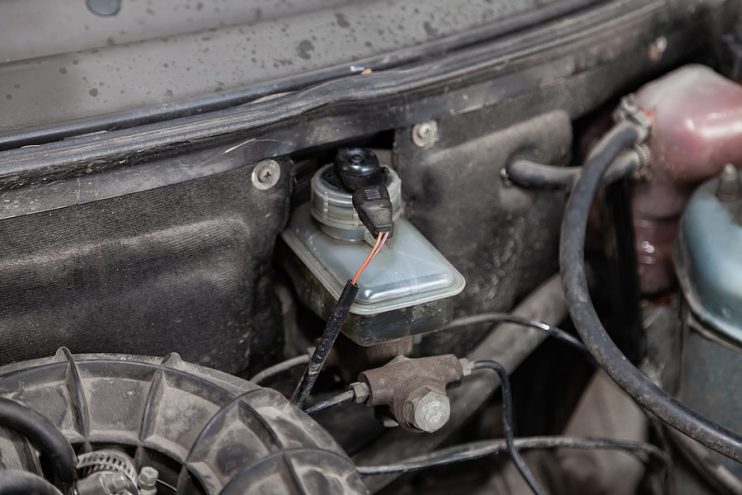
3. Contaminated Brake Fluid
As the rubber seals on the brake master cylinder slowly wear out and deteriorate over time, this can allow particles of foreign matter (such as dirt from the road, rust from degrading metal or even dust from your garage) into the system, causing contamination. Damaged seals will also mean that the system is losing pressure, giving you a spongey brake pedal.
Brake fluid should retain a clear appearance, often with a slight yellow tint. This makes it quite easy to diagnose contamination within the fluid, as it will switch to a darker brown or even a black colour. Additionally, damaged seals often result in a thick gunk accumulating on the bottom cap.
4. Reduced Braking Power
A faulty master cylinder can often cause the front brakes or only the rear brakes to fail. Braking power will be substantially reduced, with your car taking longer and further to reach a stop or slow down. This extra braking window could easily lead to an accident, especially if an emergency braking procedure is required.
Don’t rely on this symptom as a clear indicator of issues with your brake master cylinder, as many other faults can also result in a reduction in braking power, such as air in the brake lines, old brake fluid or faulty brake lines or hoses. However, always do take issues with braking seriously, as problematic brakes will put you and other road users in danger.
5. Unexpected Brake Pedal Behaviour
Your brake pedal should always be firm, and any pressure applied should correspond with an almost instant response from the braking system. If there is a problem with the master brake cylinder, this will mean the pressure within the system may drop, resulting in a spongey, unresponsive pedal. Pumping the pressure back up within the system may solve the issue in the short term, but if there is an underlying fault, then the problematic braking behaviours will soon return.
The most common reason for a spongey brake pedal is air within the brake lines, which can often be resolved by a simple fluid change. In the worst cases however, the pedal may simply sink down to your vehicle’s floor and fail to return to its set position. Never drive your car with a sinking brake pedal and call up a mechanic to check your master brake cylinder if your car is suffering from this issue.
And Finally
The brake master cylinder is to the brake system what the heart is to your bloodstream. It controls the pressure and flow of fluid to the essential parts of your car. If it’s faulty, then your whole braking system is at risk, so never ignore issues with the master brake cylinder as it will make your vehicle unsafe to drive – instead contact a technician or mechanic to have the problem diagnosed to find out if a replacement is required.


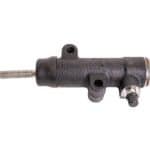
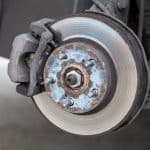

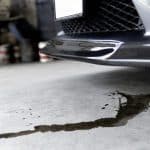
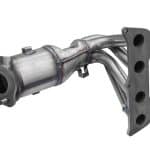
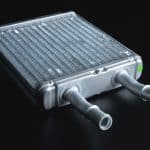
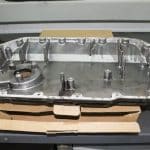
.png)